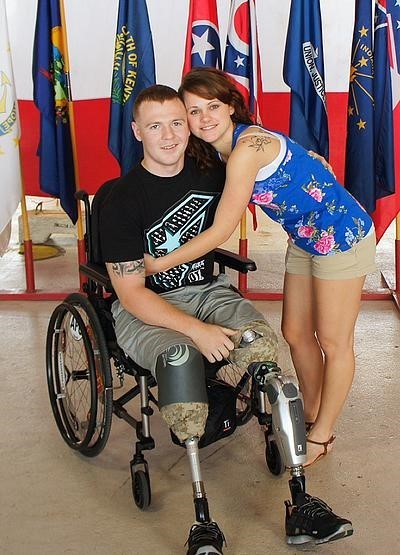
Almost two million men who served in Iraq and Afghanistan are healing, not only from physical injuries but the emotional scars, and so are their families. Learning to live with post-traumatic stress, traumatic brain injury (TBI) and physical disability takes work, by both those who have been injured and the loved ones who take care of them.
Recently, I spent time with a wives of Wounded Warriors support group, which helps women adjust to and cope with the "new normal." These women are caretakers to their spouses who have experienced amputations, broken bones and traumatic head injuries, among other things. The women support their husbands through months in the hospital and years of physical therapy -- all while balancing careers, raising children and maintaining a household.
Here are five lessons I've learned from these inspirational and strong women that we can all apply to our lives:
1. Keep a sense of humor.
Sometimes things do just suck -- and humor goes a long way. These courageous women say they'd rather laugh than cry because crying gives them a headache. They swap stories of bedpan mishaps and their husbands chasing them down the hallway in their wheelchairs. They look for the comedy in tragedy.
2. We all need to take breaks.
These emotionally resilient women know self-care is non-negotiable. They have to take care of themselves physically, just as they did while caring for young children, by eating right and getting rest. Their daily commitment and practice may include engaging in exercise and meditation, talking to a friend, having a cup of tea or just going for a walk around the block.
The Mother Lover Fighter Sage Foundation sponsors spa days for wives of Wounded Warriors, so they can relax and enjoy the luxury of a massage and then meet in a supportive group environment to learn new coping skills.
3. Focus on what's right, not what's wrong.
These women have reminded me that "where attention goes, energy flows." They cultivate what they want by tapping into the resources that the military, Family Care Givers and the Armed Services YMCA offer: free childcare, respite care and life-skills classes. Ultimately, emotional resilience is about attitude. By focusing on the positive they live more in the solution than the problem. Gratitude does go a long way.
4. Find a mentor
The military has a saying: "Lead to serve." The best part of getting these women together is the ability to learn from others who have been there and made it through. The experienced wives serve as role models and mentors. The women who have already navigated the system help those new to the rehabilitation process. This inspires me to be a mentor and find role models in my life.
5. Find mental toughness through therapy.
"In front of my children and my husband, I must be strong. I am the rock of the family caring for my husband and children. I can't crack."
But you can't be strong 100 percent of the time and that's when professionals can help. All of these women have been willing to ask for help from respite care and mental health professionals. It helps to talk to someone with whom you can cry without feeling guilty, and you learn copying methods to grow inner strength and emotional resilience.
They understand that the grief of losing the life they lived when their husband was healthy is a transition that a therapist can help with.
The bonus lesson is in learning to practice acceptance.
The wives of Wounded Warriors taught me that acceptance is not the same as compliance. It's not giving up and letting the stress take over; it's about experiencing the emotions and trusting that you will bounce back.
If you are interested in learning more or want to get involved, you can visit this site.

